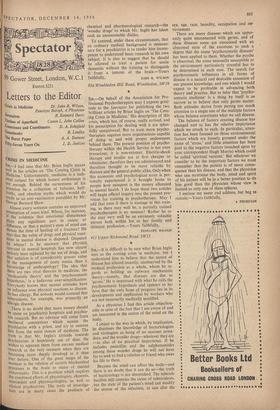Letters to the Editor C risis in Medicine Dr. John R.
Wilson,
Penelope Balogh, A Physician
Jerusalem R. Kennard Davis Victims of Apartheid Canon L. John Collins Conscience and Constituents D. A. Schofield Qamebooks R. Lindley the Burnt Paper A. A. Dumont IiitY-Sesen Years On J. D. Jenkins CRISIS IN MEDICINE feel sure that Mr. Brian Inglis means 'A well in his articles on 'The Coming Crisis in Medicine.' Unfortunately, medicine is a tech- nical subject for which honest enthusiasm is not enough. Behind the earnestness of his intention lie a collection of fallacies, half- truths, and obsolete myths which would do credit to an anti-vaccination pamphlet by Mr. George Bernard Shaw.
Almost every sentence contains an unproved assumption of some kind. Where, for instance, is the evidence that emotional disturbance Plays any significant part in cancer or influenza, or that a patient's state of mind can dictate the time of healing of a fracture? He says that the value of drugs and physical treat- ment in mental disease is disputed. Disputed by whom? Is he unaware that physical restraint in mental hospitals has now almost entirely been replaced by the use of drugs, and that sedation is of considerably greater value in the management of acute mania than a knowledge of anthropology? The idea that there are two rival theories in medicine, the hypothesis,' theory' and the 'psychosomatic Everybody is a ludicrous over-simplification. tverybody knows that mental attitudes have an Influence over physical reactions to disease. eo has allergy. But nobody would contend that tuberculosis, for example, was primarily an allergic disease.
There is no doubt that more money should be spent on psychiatric hospitals and psychia- tric research. But no advance will come from inedimval conceptions which equate the Psychiatrist with a priest, and try to remove 01111 from the main stream of medicine. The truth is that Mr. Inglis's attitude towards Psychiatrists is hopelessly out of date. He Wishes to separate them from current medical research at the very moment when they are becoming more deeply involved in it than ever before. One of the great issues of the moment is the relation of certain biochemical Processes in the brain to states of mental abnormality. This is a problem which requires the combined efforts of physiologists, chemists, anatomists and pharmacologists, as well as clinical psychiatrists. The tools of investiga- tion are in many cases the products of
chemical and pharmacological research—the 'wonder drugs' to which Mr. Inglis has taken such an unreasonable dislike.
To contend, under these circumstances, that an ordinary medical background is unneces- sary for a psychiatrist is to render him incom- petent to understand basic research in his own subject. It is also to suggest that he should be allowed to treat a patient for senile dementia without the training to distinguish it from a tumour of the brain.—Yours 83a Wimbledon Hill Road, Wimbledon, SW19










































 Previous page
Previous page